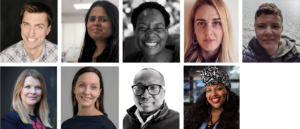Welcome to EPISODE TWO in a series of conversations with some of the makers and speakers of EPIC2021—a global, virtual conference and community promoting ethnography for impact in business, organizations and communities.
In this episode, Luc Aractingi talks with Chad Maxwell, Chief Strategy Officer at Kelly Scott Madison and co-chair of the EPIC2021 Case Studies Committee. Find out how ethnographers demonstrate the impact of their work, and how ethnography can create new kinds of value in the future.
Transcript
LUC: Hello and welcome to EPIC interviews, a series where we get to know the makers and the host of the conference EPIC. This year our theme is anticipation, and today we’ll be interviewing Chad Maxwell, who’s Chief Strategy Officer at KSM. Chad, thank you for coming. We’re very excited to have you here today. Could you tell us more about your role at EPIC?
CHAD: Sure. Thanks for having me. It is great to be here. My role at EPIC is I am one of the chairs for the case studies section of the conference.
LUC: Could you tell me more about what is a case study?
CHAD: Yeah, I mean, I’m biased, but case studies are the best part of the conference. No, in all honesty, the case studies are basically a platform for demonstrating a unique question that you’re trying to solve for a business or an organization and the impact your methodologies in your approach has on that organization or business.
LUC: And what goes into selecting them?
CHAD: There’s a number of factors that go into selecting them. The first one, of course: Is it on point for the conference? Is it demonstrating the theme of anticipation? The second one is, of course, research methods. Are the methods appropriate? The third element we look for is that meaty research question that we’re trying to solve for. It unique and new? Is it going to add value to the community? And the fourth that I think most important part and differentiating for case studies is demonstrable impact and results. That’s different from than insights or conclusions. We are looking for: how did you move an organization, or how did you move a business with actual, true, measurable impact?
LUC: Could you tell us more about the selection process for the case studies?
CHAD: I think what I love about the submission process, the vetting process, and the selection process is it’s rigorous, and people care a lot. Myself, other co-chairs and the entire committee look at all the submissions, and they look at them individually and in aggregate. So, what is the total portfolio of submissions we have? And then, we analyze those across a number of different kinds of dimensions.
 EPIC2021 Case Studies Committee, L to R: Chad Maxwell, Richa Rai, Ovetta Sampson, Gillian Bowan, Lee Cesafsky, Sophie Goodman, Anni Ojajärvi, Dimeji Onafuwa, Renee Reid
EPIC2021 Case Studies Committee, L to R: Chad Maxwell, Richa Rai, Ovetta Sampson, Gillian Bowan, Lee Cesafsky, Sophie Goodman, Anni Ojajärvi, Dimeji Onafuwa, Renee Reid
One is, does it fit with the conference, right? Is it on a thematic point? Does it demonstrate anticipation for this year, for example. Does it have a really great immediate research question that’s tied to kind of an organization or a business question? So it needs to really demonstrate that it’s working on a larger question than just a user or a person question, but towards a business question or organization question. The third one is, are there robust methods that answer that question that are appropriate? Is there any kind of uniqueness to those approaches, too, is something we always look for. Like, is it innovative and new. And the fourth one—and I think this is to your question kind of how they’ve changed over time, that is absolutely most important in differentiating the case studies—is this idea of impact and results. It’s just not enough to talk about the methods and the problem and what you learn, and insights. All of that is excellent, super important. But the differentiator for case studies is about impact and results that were driven by the great ethnographic work. I think this is hugely important today. We forget about this because we’re researchers, right? We love swimming in our data and our methods. We love just looking at what people say and really nostalgically thinking of that great fieldwork, but it’s not enough anymore. It is not enough for organizations. It’s not enough to land your next job. You have to talk about the impact your work made.
And listen, right? I’m in business. It’s not just about the bottom line or anything like that. If you work for an NGO or a nonprofit, are you saving more forests? Are you getting more people to donate money to your cause? Are you getting more members as a part of your organization? Are you helping heal more sick people? Like, your work has got to show that impact and value. That is a huge portion of case studies and something I know we’ve worked very hard to evolve over the years. It’s funny too, right? I work with a lot of people to getting their first jobs, or I interview people that are researchers and they come in, and they talk about those methods, and they talk about their field experience. That is wonderful, but it gets really difficult for them to talk about what the results were. What was the impact.
And case studies are a way of turning EPIC on its head a little bit, right? Let’s start with what impact we made and then how we got there. And, and it’s invaluable. Honestly, as we think about the growth we want for the community in terms of work, in terms of great research questions, the only way we get more of that is to show the impact we have. And, if you look at Anthro-Design, if you look at the different conversations we’ve had over the years in EPIC, it’s always about: Prove it. What’s the ROI on ethnography. Like this is an age-old question we spin on. What I find is we’re always on the defensive; we’re always justifying who we are and defending our work and defending qualitative, defending ethnography. I’m done with that.
I want all of us to be done with that. I want us to sit in a position of the offense and unapologetically show our craft, our approach, yields true, measurable impact, and unapologetically move forward with that.
LUC: I was wondering if you could tell us more about the future of case studies and how have you seen them evolve throughout the years?
CHAD: I think we’re at a really unique point, and we can kind of anticipate, if you will, where case studies are going to go because we can start to anticipate where the craft is going, right? The digitization—the digital and netnography type work—it’s going to flourish more and more. That means all that data is digital. I think the future of case studies will be a hybridization much more than we’ve seen of the approaches we’ve had in the past. I’m talking deep infusion of data science plus ethnographic approaches using ethnography to actually create big data sets and explore that big data set as an overall field site. That’s very close to my heart in terms of more of an ethnographic analytics approach.
I think really taking the digital data that we accumulate and not just collaborating with others, but adopting more of those skills to make our ethnographic skills even stronger. And looking at things in terms of text analysis and new, almost-AI like ways. How does machine learning intersect in interesting ways with robust ethnographic data? I know I’ve watched over the years voice-to-text evolve. I remember when we would transcribe stuff, trying to use Dragon naturally speaking, when it first came out, and it was awful. But now things exist even like fireflies.ai, which is a great product, which will automatically transcribe and record calls while you’re on them. I mean, that’s a huge amount of data, and we’re not going to just be able to code that like we historically were would. And so I think syncing up those kinds of skills, integrating methodological approaches and really instantly showing impact where possible will be the future of case studies, for sure.
LUC: You’ve been at EPIC for the last 10 years. Could you tell us more about your first time?
CHAD: Yeah. I love EPIC, and I stumbled across it on the Anthro-Design listserv. It was probably, gosh, I know it was over a decade ago, maybe 15 years at this point, and it was in Boulder, Colorado. I walked in, and I heard the people speaking. I remember Tony Salvador and Ken Erickson speaking, met Donna [Flynn] and everyone and was blown away. Like I had found my people finally. I just found my people. Like suddenly ethnography wasn’t just this cool, cute thing where we tell stories about people—people were doing things with it. I fell in love, head over heels, instantly.
It opened doors to an applied career. It opened doors to helping with things like this with case studies and trying to pay it forward. I’ve never looked back. And EPIC was instrumental because I was lost in anthropology. I loved everything about it. I know anthropology is not ethnography, but I found it via anthropology. I was struggling because I just didn’t know where to take this awesomeness, and then all these doors opened at that first EPIC conference. Every conference I have gone to since then, more and more doors open, and I’m a better practitioner for it. So, if you’re lost, if you need to find a place, a home, you want to do great things with ethnography, with great people—EPIC is the place for you. I feel like I just got paid to say that, but I really didn’t.
I just believe in the mission and the group that much.
LUC: What excites you the most about this year’s conference?
CHAD: I think what excites me the most about this year’s conference is simply the fact that we’ve gotten much better at digital conferencing. I think the content is superb, and I think the theme is more relevant than ever. I mean, it is so difficult to future-proof organizations, and it’s so difficult to anticipate what’s next. We have to be thinking about that with great agility right now. The conference is more relevant than ever because the problems also we need to solve are more relevant than ever.
LUC: Absolutely. Do you have any advice you would give to newcomers who come to visit EPIC for the first time?
CHAD: Reach out. Go talk to people whose work you love, who inspired you, who’s helping you solve a problem. Personally, like when I first started at EPIC, I was really intimidated. I was like, holy hell. These are some really smart people doing some amazing things. And I didn’t reach out. I was super introverted and shy about it. The community is unbelievably welcoming of new people. They want to hear and talk to you—do not hesitate to reach out. It might be weird. It might be awkward, but I assure you, everyone wants to talk to you, reach out.
LUC: Well, thank you so much for coming today. It’s been a real pleasure. We look forward to seeing you at the conference.
CHAD: No, I thank you very much for having me. It’s been a pleasure. I’ve a huge passion for this organization, the work. Attend the conference, everyone and have an absolutely magical time.
Luc Aractingi holds an MA in social anthropology and art history from University of St Andrew’s, and a BA in economics from Grand Lycée Franco-Libanais Beyrouth. He’s worked on a range of insights projects and speaks Arabic, English, French and Italian.


0 Comments